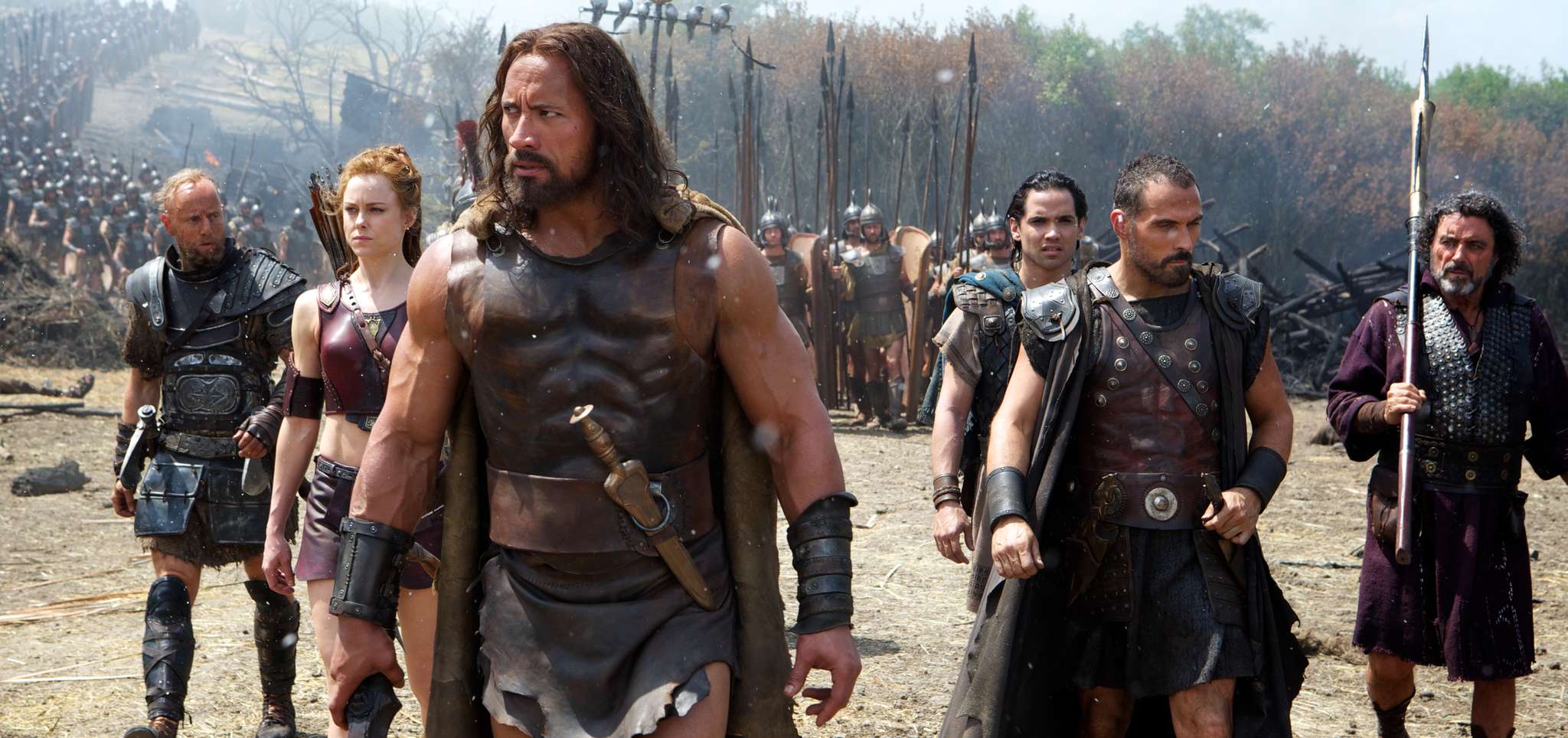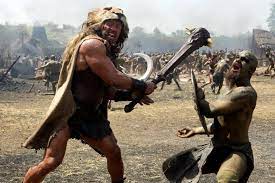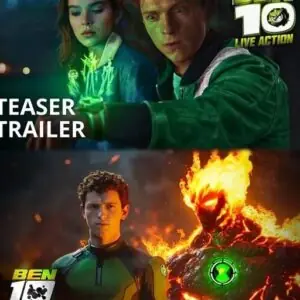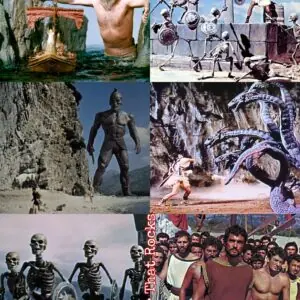Directed by Brett Ratner and starring Dwayne Johnson in the title role, Hercules (2014) isn’t your typical gods-and-monsters epic. Loosely based on the graphic novel Hercules: The Thracian Wars by Steve Moore, this film presents a gritty, humanized version of the demigod hero, stripping away most of the traditional mythology and replacing it with political intrigue, military action, and questions of belief and legend.
While it may disappoint mythology purists hoping for epic duels with hydras and harpies, it’s also a surprisingly watchable and entertaining sword-and-sandal adventure that doesn’t take itself too seriously. It blends grounded realism with just enough mythological flavor to make the tale engaging for a modern audience.
Plot Summary: The Legend Behind the Man
Hercules reimagines the titular hero as a mercenary haunted by his past. The film opens with a stylized retelling of the legendary Twelve Labors—slaying the Nemean Lion, the Lernaean Hydra, and the Erymanthian Boar—before cutting to the “real” world. These acts, we quickly learn, may have been embellished or fabricated by his companions to build up his legend.
Now a grizzled, world-weary warrior-for-hire, Hercules leads a band of loyal followers: the prophet Amphiaraus (Ian McShane), the archer Atalanta (Ingrid Bolsø Berdal), the knife-wielding Autolycus (Rufus Sewell), the mute berserker Tydeus (Aksel Hennie), and his loyal nephew Iolaus (Reece Ritchie), who serves as both scribe and spin doctor.
When Lord Cotys of Thrace (John Hurt) hires Hercules and his team to train his army and repel a supposedly monstrous warlord named Rhesus, the team gets drawn into a conflict that tests not only Hercules’ strength, but his morals. The plot thickens as political betrayal and manipulation are revealed, and Hercules must decide whether to live up to the myth others believe—or to forge his own path.

H-00118C
Performance: Dwayne Johnson as a Human Hero
Dwayne Johnson brings his signature mix of charisma and physical power to the role of Hercules. It’s a perfect fit. Rather than portraying a godlike figure, Johnson’s Hercules is a man weighed down by trauma, regret, and the burden of his own legend. The film plays with the ambiguity of whether Hercules is truly divine or simply a man whose reputation outgrew him, and Johnson’s nuanced performance keeps both possibilities alive throughout.
What elevates the performance is Johnson’s restraint. He’s not cracking jokes or flexing his ego. He plays Hercules as serious, even tragic, but not overly brooding. His chemistry with the ensemble—particularly with McShane’s sarcastic Amphiaraus and Sewell’s pragmatic Autolycus—adds levity and dimension to the story.

Supporting Cast: A Strong Ensemble
Ian McShane is a scene-stealer as Amphiaraus, the warrior-seer who keeps predicting his own death with comic flair. His philosophical rants and dry humor serve as a welcome counterpoint to the film’s darker moments.
Rufus Sewell is perfectly cast as the skeptical, morally flexible Autolycus, bringing a mercenary’s sarcasm and occasional heart. Ingrid Bolsø Berdal impresses as the fierce and silent Atalanta, the lone woman in the group who handles a bow with deadly precision.
John Hurt brings gravitas to the role of Cotys, though seasoned viewers might guess his true intentions early on. Joseph Fiennes also makes a memorable appearance, though in a limited role, as the scheming King Eurystheus—responsible for much of Hercules’ tragic past.
Action and Visual Style
The film’s action is where it truly shines. The battle scenes are large-scale, well-choreographed, and satisfyingly brutal. Unlike many modern action films, Hercules doesn’t over-rely on shaky cam or excessive CGI. The combat feels weighty and real, with a mix of brutal melee fighting, tactical warfare, and a few mythological flourishes for good measure.
One of the film’s most effective tricks is in its restraint. While it teases the audience with glimpses of mythological monsters—such as the hydra or the three-headed wolf—these are revealed to be exaggerated or metaphorical. This creative decision gives the film a unique identity: it’s a story about how legends are born, not necessarily how they’re lived.
The production design leans heavily into the muddy, bloodstained realism of the ancient world, drawing visual inspiration from films like Gladiator and 300, but stopping short of the stylized slow-motion excess of the latter. Cinematographer Dante Spinotti brings a grounded aesthetic that matches the film’s more realistic take on Hercules.

Themes: Belief, Redemption, and the Power of Legend
Beneath the swordplay and shield-bashing, Hercules wrestles with deeper questions: Is belief more powerful than truth? Can a man escape the shadows of his past? Does the myth define the man, or the man define the myth?
Hercules is presented as a tragic figure shaped by the loss of his wife and children—a murder he believes himself responsible for. Haunted by guilt and doubt, he’s not the invincible hero of legend but a deeply flawed human being. Yet, it’s precisely that humanity that makes his eventual heroism more powerful. He doesn’t become a hero because of divine heritage; he becomes one by choice.
This version of Hercules isn’t about fighting gods—it’s about reclaiming agency and redefining legacy. That’s a bold take for a film of this genre and helps Hercules stand apart from more cartoonish interpretations of the character.
Flaws: Predictability and Tone Shifts
Despite its strengths, Hercules isn’t perfect. The plot unfolds in predictable beats—if you’ve seen any “reluctant warrior redeems himself” story, you’ll know what’s coming. The political twists are obvious, and some character motivations are underdeveloped.
The film also struggles a bit with tone. It shifts between grim drama, myth-debunking, and buddy-movie banter. While the humor mostly works, a few scenes feel like they belong in a different movie altogether. Still, these tonal shifts aren’t too jarring and may even add to the film’s broad appeal.
Conclusion
Hercules (2014) isn’t the mythical epic some audiences may have expected, but that’s exactly why it works. By discarding divine spectacle in favor of grounded storytelling, Brett Ratner’s film delivers a character-driven, action-packed reimagining of one of the world’s most iconic heroes.
Dwayne Johnson anchors the film with a performance that is both physically imposing and emotionally resonant, supported by a capable cast and solid direction. The film’s central message—that heroism isn’t about bloodline or prophecy, but about choice—rings true, and adds unexpected depth to an otherwise straightforward action-adventure.
Final Rating: 7/10
A flawed but fun retelling that proves even the greatest legends have human hearts—and serious muscle.





